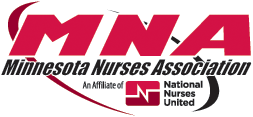FOR IMMEDIATE RELEASE
Contact: Shannon Cunningham
(c) 651-269-1418
shannon.cunningham@mnnurses.org
Kayla Drake
(c) 314-448-8064
kdrake@momentum-advocacy.com
(St. Paul) – May 15, 2025 – Nurses and supporters rallied outside the Medical Alley Annual Dinner this evening to demand accountability from healthcare executives and CEOs who continue to uphold a healthcare system that puts profits over patients.
The Medical Alley Annual Dinner is a who’s-who of Minnesota’s healthcare so-called elites — a closed-door celebration of power where hospital executives, insurance industry leaders, and corporate financiers gather to conduct insider conversations while patients and frontline workers wait patiently for fair staffing levels to be discussed with those delivering patient care on the front lines in hospitals statewide. Nurses showed up in force to disrupt that narrative and call out the dangerous consequences of corporate dominance in healthcare.
“For too long, decisions that impact patient outcomes and caregiver safety have been made by people who are disconnected from the struggles caregivers face,” said Jill Lebrun, RN. “These CEOs and board members sit on each other’s boards, trade favors across systems, and profit off a model of care that leaves both patients and nurses behind in service of financial growth each quarter. The overlap between hospital leadership and corporate leadership is not only unethical — it’s unsafe.”
As ever, Minnesota nurses are leading from the front. With chants, signs, and testimonies, nurses and allies reminded the public and healthcare industry leaders that CEOs and board members should balance networking with listening to caregiver requests for safer staffing levels to improve patient care. Rising workplace violence and increasing nurse turnover due to unsafe staffing ratios are not abstract policy problems — they’re the real, measurable consequences of profit-driven decision-making.
“While hospital industry leaders are focused on increasing profit margins, we are at the bedside holding patients’ hands, explaining delayed discharges to families, running to codes, and cleaning up the messes their budgets created,” said Kelley Anaas, RN from Abbott Northwestern. “We’re tired of being treated like numbers on a spreadsheet instead of the professionals who keep people alive.”

